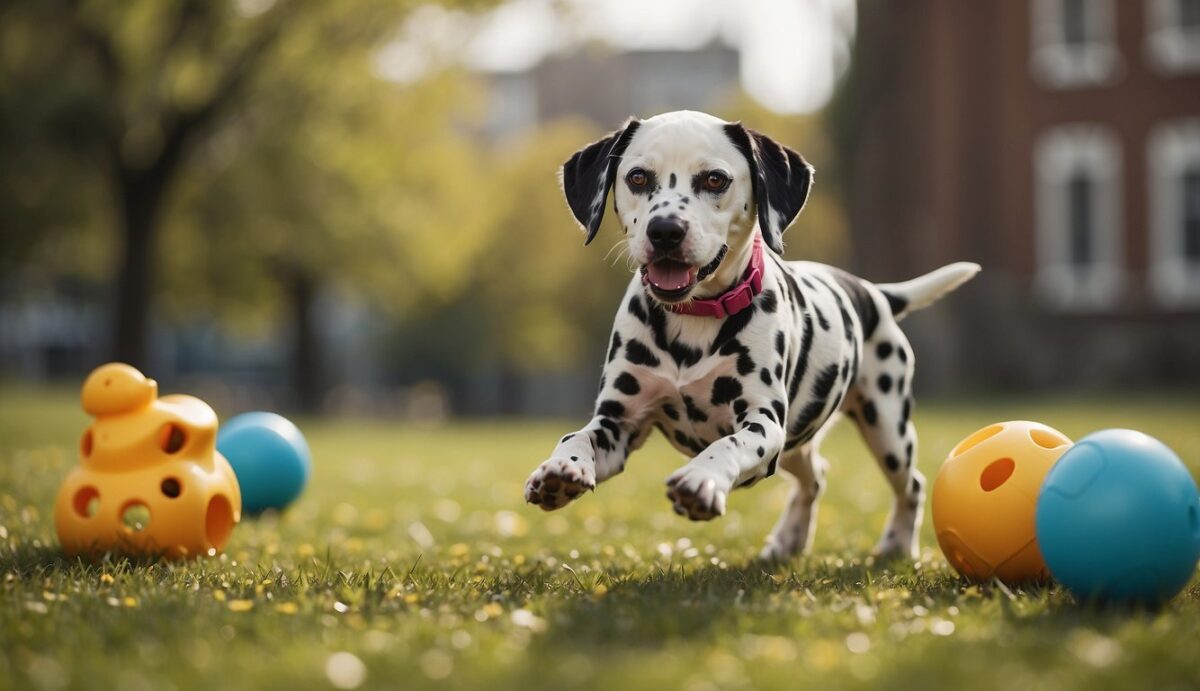Obesity in Dalmatians is a significant health concern that can have serious implications for your spotted friend.
Like humans, dogs can suffer from excessive weight gain. Certain breeds, such as Dalmatians, may be more susceptible due to genetic and lifestyle factors.
Maintaining a healthy weight is crucial for the overall well-being of your Dalmatian. It can prevent various health issues and enhance their quality of life.
Understanding the causes of obesity and implementing effective prevention strategies is essential in ensuring that your Dalmatian remains fit, active, and healthy.

Recognizing the risks associated with obesity in dogs, particularly in Dalmatians, is the first step toward proactive management of your pet’s health.
Excessive weight can lead to a range of complications, including joint problems, heart disease, diabetes, and exacerbated genetic disorders like deafness.
As a responsible pet owner, you need to be aware of your Dalmatian’s dietary needs, caloric intake, and appropriate exercise routines.
With proper nutrition, regular exercise, and informed lifestyle choices, you can help your Dalmatian avoid obesity and its associated risks.
Key Takeaways
- Maintaining a healthy weight in Dalmatians is crucial for preventing health issues.
- Obesity can lead to serious complications like joint problems and heart disease in Dalmatians.
- A balanced diet and regular exercise are key to managing your Dalmatian’s weight.
Understanding Obesity in Dalmatians

When you consider the health of your Dalmatian, understanding obesity is crucial as it is closely linked with several health risks and can significantly impact their well-being.
Defining Obesity
Obesity in Dalmatians is characterized by an excess of body fat that is enough to impair health, mobility, and overall quality of life.
To determine if your Dalmatian is obese, veterinarians measure body condition score (BCS), which assesses the amount of fat on a dog’s body.
Prevalence of Obesity in Dalmatians
Your Dalmatian is not alone if they are struggling with obesity. A notable proportion of Dalmatians grapple with this issue, which is a major concern among pet owners due to the adverse health outcomes associated with excess weight.
Genetic Makeup and Obesity
The genetic makeup of Dalmatians can predispose them to obesity, especially without proper diet and exercise.
Genetics influences metabolism, appetite, and the tendency to gain weight, making it important to understand your dog’s specific needs.
Common Health Problems Associated with Obesity
Being aware of the health problems linked to obesity will help you take preventive measures:
- Hypertension: Elevated blood pressure, a consequence of obesity.
- Diabetes Mellitus: A disorder of carbohydrate metabolism resulting from obesity.
- Osteoarthritis: A degenerative joint disease that obesity can exacerbate.
- Cardiomyopathy: Heart muscle disease making it hard for your Dalmatian’s heart to deliver blood to the body.
- Dyslipidemia: Abnormal amount of lipids in the blood, often observed in obese pets.
- Nonalcoholic Fatty Liver Disease: Excess fat accumulation in the liver cells, influenced by obesity.
- Cancers: Overweight Dalmatians may have an increased risk of developing certain types of cancer.
Causes and Risk Factors
When considering the causes and risk factors of obesity in Dalmatians, it’s important to understand that a combination of diet, activity levels, health conditions, medications, and everyday lifestyle can all contribute to their weight gain. Let’s explore these factors in depth.
Diet and Nutrition
Your Dalmatian’s weight is heavily influenced by its diet. Obesity can occur if your pet is:
- Consuming more calories than it burns.
- Eating high-fat foods or treats.
- Experiencing a lack of proper nutritional balance.
It’s crucial to measure food portions and ensure that the food you provide is formulated to meet your Dalmatian’s specific nutritional needs.
Physical Inactivity and Sedentary Behaviors
A key cause of weight gain is a lack of physical activity. Dalmatians, in particular, need regular exercise to maintain a healthy weight.
If your dog doesn’t engage in daily walks or playtime, it’s likely they could become overweight. Encourage your Dalmatian to be active to prevent obesity.
Medical Conditions and Medications
Some Dalmatians may struggle with weight due to underlying medical conditions such as hypothyroidism, which can slow metabolism.
Additionally, certain medications can lead to weight gain. If your dog is on medication or has a health disorder, discuss their weight management with your vet.
Environmental and Lifestyle Factors
Your Dalmatian’s environment can impact its weight. Factors include:
- Easy access to excessive food.
- Low engagement in physical activities due to space restrictions or your own busy lifestyle.
- Sleep patterns can also influence metabolism and weight.
Moreover, your personal lifestyle factors, like your habits and routines, directly affect your pet’s health.
Complications and Comorbid Conditions

When your Dalmatian faces obesity, it isn’t just about extra weight. It’s a condition that can lead to a variety of health issues which might affect not only their physical well-being but also their happiness and overall quality of life.
Cardiovascular Diseases
Obesity in Dalmatians can put a strain on their heart, potentially leading to cardiovascular disease (CVD). This includes conditions such as heart failure and an increased risk of stroke.
Fatty deposits may build up in their arteries, making it harder for blood to circulate.
Diabetes and Insulin Resistance
Excessive adipose tissue can cause your Dalmatian to develop type 2 diabetes due to the body’s inability to use insulin correctly, known as insulin resistance.
This imbalance in glucose levels can have severe effects on your pet’s health, necessitating lifelong management.
Joint and Musculoskeletal Disorders
Obesity can be tough on your Dalmatian’s joints, leading to conditions like osteoarthritis. This can cause pain and reduce mobility, impacting their ability to play and move comfortably.
Respiratory and Sleep Disorders
Overweight Dalmatians can suffer from breathing difficulties, with conditions such as sleep apnea being quite common. This disorder disrupts normal sleep patterns, which can affect overall health and energy levels.
Mental Health and Quality of Life
Obesity can be linked to mental health concerns in dogs. A Dalmatian carrying excess weight may experience depression or anxiety, affecting their quality of life.
Preventing Obesity in Dalmatians

Maintaining a healthy weight for your Dalmatian is crucial for their overall health and longevity. It’s important to focus on a balanced diet, consistent exercise, and ongoing education to prevent obesity.
Implementing a Healthy Diet
To prevent obesity in your Dalmatian, a healthy diet is essential.
Feed your furry friend high-quality dog food that’s appropriate for their age, size, and activity level. Be cautious with treats and avoid giving them table scraps.
A balanced diet includes:
- Protein: Lean meats like chicken or fish.
- Fruits and Vegetables: Appropriate options like carrots or apples for snacks.
- Grains: Limited amounts, if any, depending on dietary needs and veterinarian advice.
Remember to measure your dog’s food portions to prevent overfeeding and adjust the amounts based on their weight and activity levels.
Encouraging Regular Exercise
Regular exercise not only helps with weight loss but is also a preventative measure against obesity. Dalmatians are an energetic breed and require:
- Daily Walks: At least 30 minutes to an hour each day.
- Playtime: Interactive games like fetch or frisbee can keep them active.
- Mental Stimulation: Puzzle toys that encourage movement.
Creating a routine will help incorporate exercise into your Dalmatian’s lifestyle and manage their weight effectively.
Lifestyle Changes for Weight Management
Embracing a healthy lifestyle means making choices that promote weight management. To support your Dalmatian’s health:
- Monitor Weight: Regular check-ins to track changes.
- Adequate Sleep: Ensure they have a comfortable and quiet place to rest.
- Limit Treats: Use them sparingly and as part of training rewards.
These simple steps can have a significant impact on preventing obesity in your dog.
Role of Veterinary Care and Education
Ongoing veterinary care is critical for preventing and managing obesity. Your veterinarian can provide:
- Patient Education: Information on proper feeding and exercise.
- Health Assessments: Regular check-ups to monitor weight and overall health.
- Preventative Measures: Vaccinations, parasite control, and dental care to maintain overall health and prevent diseases that can lead to inactivity and weight gain.
Support and Intervention Strategies

When it comes to tackling Dalmatian obesity, a combination of tailored interventions and management strategies is key to supporting your dog’s health and well-being. Let’s explore some effective approaches.
Weight Management Programs
Weight management programs are fundamental for managing obesity in Dalmatians. As a pet owner, you can enroll your Dalmatian in a veterinarian-supervised weight management program.
These programs typically include a diet plan with controlled calorie intake, scheduled feeding times, and a regular exercise routine. Regular weigh-ins and progress tracking are essential components to ensure your dog is on the right track.
Pharmaceutical Treatments
In some cases, your veterinarian might suggest pharmaceutical treatments to aid weight loss in addition to diet and exercise.
One such medication is metformin, which is occasionally used off-label in dogs to improve insulin sensitivity. However, always consult with your veterinarian as these treatments must be supervised due to potential side effects and specific dosage requirements.
Bariatric Surgery for Severe Cases
Bariatric surgery is a more drastic intervention usually reserved for severe cases of obesity where other interventions have failed. This type of surgery is designed to physically limit food intake.
While it is uncommon in veterinary medicine compared to human healthcare, the options do exist and might be a consideration for your Dalmatian’s health care system if other weight management strategies are unsuccessful.
Community and Built Environment
Finally, the community and built environment play significant roles in supporting your Dalmatian’s weight management journey. This includes everything from having accessible parks for exercise to being part of community interventions like pet weight loss groups.
Engaging in an environment that promotes regular physical activity and social connections can greatly benefit your Dalmatian’s health.
Special Considerations for Dalmatians

When considering obesity in Dalmatians, it’s essential to be aware of their unique health challenges and care needs. This section will explore the specifics that every Dalmatian owner needs to consider.
Species-Specific Health Issues
Dalmatians have a unique genetic makeup that can predispose them to certain health issues, particularly regarding uric acid metabolism, which can lead to urinary problems.
To prevent complications, encourage your Dalmatian to drink plenty of water and monitor for signs of urinary stones.
Deafness is also more common in Dalmatians, so keep an eye out for signs of hearing loss, especially as they can affect your dog’s responsiveness to behavioral training. Regular hearing check-ups can be beneficial.
Other potential health concerns include skin allergies, hip dysplasia, and epilepsy. These conditions often require ongoing care or preventive measures, so it’s important to talk to your vet about specific needs for your Dalmatian.
Breeding and Genetic Counseling
If you’re planning to breed your Dalmatian, genetic counseling is highly recommended. Understanding the risks of transmitting conditions like hip dysplasia and deafness can guide responsible breeding decisions.
Tests for autoimmune thyroiditis, common in dogs with endocrine issues, can inform which animals are suitable for breeding.
Grooming and Physical Care
Dalmatians have short coats but shed heavily, requiring regular grooming to manage skin allergies and keep their coat healthy. You should incorporate:
- Brushing at least twice a week to remove loose fur.
- Bathing when necessary, using hypoallergenic shampoo to prevent skin irritation.
Consider your dog’s need for exercise and plan an active routine to support healthy uric acid metabolism and prevent obesity.
Behavioral Training for Obesity Prevention
Preventing obesity in your Dalmatian begins with behavioral training. This includes:
- Feeding Habits: Train your dog to eat slowly and on a schedule to prevent overeating.
- Exercise Routine: Establish routine walks, runs, and play sessions to manage weight.
Consistent training is crucial, and it may be challenging if your Dalmatian has hearing issues. Use hand signals and other visual cues to reinforce commands for deaf dogs.
Frequently Asked Questions

In this section, you’ll find concise answers to commonly asked questions concerning Dalmatian obesity, its implications, and the various strategies for prevention and treatment.
What factors contribute to obesity in dogs?
Your dog’s weight gain can be attributed to a lack of physical activity, excessive caloric intake, and sometimes breed-specific genetic predispositions. For Dalmatians, maintaining a balance between their energy consumption and expenditure is crucial.
How does being overweight affect a dog’s lifespan?
Being overweight can significantly shorten your dog’s lifespan. Obesity in dogs has been linked to a host of health issues, including diabetes and joint problems, which can reduce their life expectancy.
What are effective methods to prevent obesity in our canine companions?
Preventing obesity in your dog involves regular exercise, such as walks and play sessions, and maintaining a well-balanced diet. Consult with your veterinarian to establish a nutritional plan that fits your dog’s specific caloric needs.
Could you explain the health risks associated with obesity in dogs?
Obesity in dogs increases their risk of developing illnesses like heart disease, diabetes, and joint disorders. Excessive weight can also lead to decreased stamina, heat intolerance, and an overall lower quality of life.
What are the best approaches to treating obesity in dogs?
The best treatment for obesity in your dog includes a combination of dietary changes and increased physical activity. Your veterinarian can help create a tailored weight reduction program to gradually achieve a healthy weight.
Why is obesity considered a significant health issue for pets?
Obesity is considered a significant health issue for pets. This is because it predisposes them to a myriad of health complications. These include metabolic disorders, mobility issues, and certain types of cancers. It can also lead to a less active and potentially shorter life.

